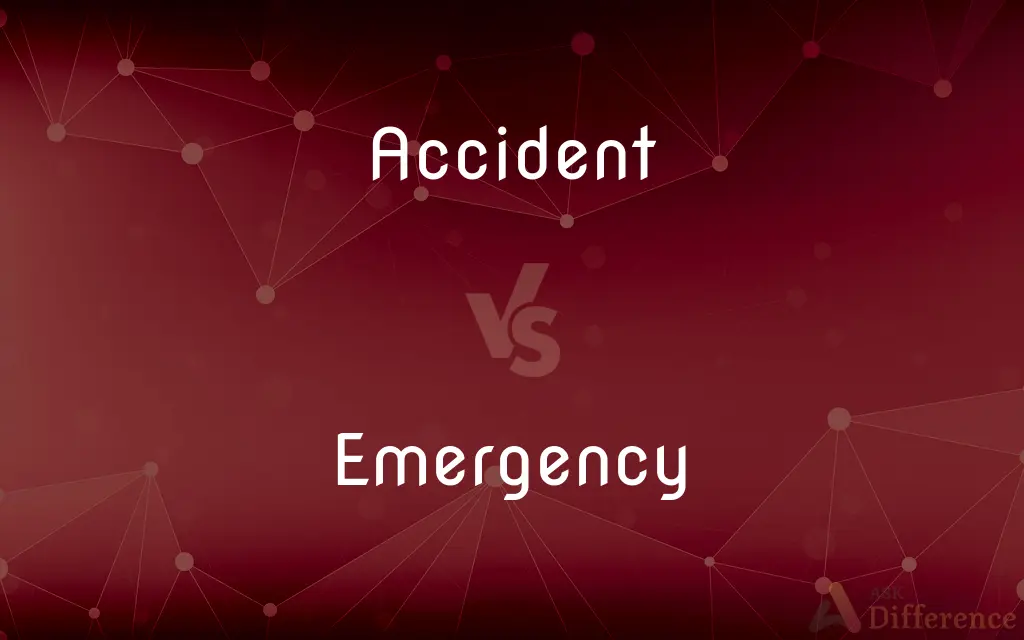Accident vs. Emergency — What's the Difference?
Edited by Tayyaba Rehman — By Fiza Rafique — Updated on March 3, 2024
An accident is an unexpected event causing damage or injury, while an emergency is a serious, unexpected situation requiring immediate action.

Difference Between Accident and Emergency
Table of Contents
ADVERTISEMENT
Key Differences
Accidents are unforeseen incidents that result in harm or damage, often occurring suddenly and without warning. They can involve vehicles, machinery, or people and typically necessitate a response to manage the aftermath. Emergencies, on the other hand, encompass a broader range of urgent situations, not only stemming from accidents but also natural disasters, health crises, or security threats. These situations demand immediate attention to prevent further harm or to restore safety.
While accidents are characterized by their unexpected nature and the immediate harm they cause, emergencies are defined by the need for immediate intervention to address a critical situation. An emergency could be triggered by an accident, such as a car crash necessitating an urgent medical response, or it could arise from other scenarios like a flood or a heart attack.
The scope of an accident is typically more limited, often affecting individuals or localized areas. In contrast, emergencies can vary greatly in scale, potentially impacting entire communities or regions. This distinction highlights the difference in response efforts, where accidents might require localized assistance, whereas emergencies could necessitate a coordinated response from multiple agencies.
Accidents often lead to emergencies, especially when they cause significant harm or disruption. For instance, an industrial accident can lead to an environmental emergency requiring extensive cleanup and evacuation efforts. Conversely, not all emergencies stem from accidents; for example, a pandemic is considered an emergency due to its widespread health implications, despite not being an accident.
The management of accidents and emergencies involves different levels of preparation and response. Accident management may focus on prevention, immediate response, and recovery, specifically addressing the causes and effects of accidents. Emergency management, however, encompasses preparedness, response, mitigation, and recovery from a wide range of urgent situations, employing broader strategies to handle the complexities of emergencies.
ADVERTISEMENT
Comparison Chart
Definition
An unexpected event causing damage or injury
A serious, unexpected situation requiring immediate action
Causes
Often physical incidents, such as collisions or falls
Can be caused by accidents, natural disasters, health crises, or security threats
Scope
Generally localized, affecting individuals or small areas
Can range from localized to widespread, impacting large communities or regions
Response
Focuses on immediate harm management and recovery
Requires urgent intervention to prevent further harm or to restore safety
Examples
Vehicle crashes, workplace accidents
Natural disasters, medical crises, security incidents
Compare with Definitions
Accident
Incidents causing unintentional injury.
He broke his leg in a skiing accident.
Emergency
Urgent medical situations.
The heart attack patient was rushed to the hospital in an emergency.
Accident
An unforeseen event resulting in harm or damage.
The factory accident caused several injuries.
Emergency
A serious situation requiring immediate action.
The firefighters responded to an emergency call about a forest fire.
Accident
A mishap without an apparent cause.
An accident on the icy road led to a multi-car pile-up.
Emergency
Unexpected crises demanding rapid response.
An emergency meeting was called after the security breach.
Accident
Events leading to property damage.
A minor accident in the parking lot dented her car.
Emergency
Situations calling for immediate intervention to prevent harm.
The sudden flood created an emergency evacuation scenario.
Accident
Situations occurring by chance or unexpectedly.
An accident during the experiment produced a surprising result.
Emergency
Conditions that pose immediate risk to health, life, property, or environment.
The chemical spill was declared an environmental emergency.
Accident
An accident is an unintended, normally unwanted event that was not directly caused by humans. The term accident implies that nobody should be blamed, but the event may have been caused by unrecognized or unaddressed risks.
Emergency
An emergency is a situation that poses an immediate risk to health, life, property, or environment. Most emergencies require urgent intervention to prevent a worsening of the situation, although in some situations, mitigation may not be possible and agencies may only be able to offer palliative care for the aftermath.
Accident
An unfortunate incident that happens unexpectedly and unintentionally, typically resulting in damage or injury
If you are unable to work owing to accident or sickness
He had an accident at the factory
Emergency
A serious situation or occurrence that happens unexpectedly and demands immediate action.
Accident
An unexpected and undesirable event, especially one resulting in damage or harm
An accident on the assembly line.
Car accidents on icy roads.
Emergency
A condition of urgent need for action or assistance
A state of emergency.
Accident
Unusual appearance or effect.
Emergency
For use during emergencies
Emergency food rations.
Accident
Anything that happens by chance without an apparent cause
Emergency
A situation which poses an immediate risk and which requires urgent attention.
Cardiac arrest is an emergency and if you find someone in cardiac arrest you should call 999 immediately.
Emergency
A sudden unforeseen crisis (usually involving danger) that requires immediate action;
He never knew what to do in an emergency
Emergency
A state in which martial law applies;
The governor declared a state of emergency
Common Curiosities
What is an emergency?
An emergency is a serious situation that arises unexpectedly and requires immediate action.
What is an accident?
An accident is an unexpected event that results in injury or damage.
What are examples of emergencies?
Natural disasters, medical crises, and security threats are typical examples of emergencies.
How is the response to an accident different from an emergency?
Accident response often focuses on immediate harm management, while emergency response encompasses broader strategies for urgent intervention.
Can emergencies occur without an accident?
Yes, emergencies like natural disasters or pandemics can occur independently of accidents.
What are examples of accidents?
Vehicle crashes, workplace injuries, and slip-and-fall incidents are common examples of accidents.
How do accidents and emergencies differ in scope?
Accidents are generally more localized, while emergencies can have a wider impact, affecting large areas or populations.
Can an accident lead to an emergency?
Yes, accidents can escalate into emergencies if they cause significant harm or require urgent intervention.
How do governmental agencies respond to emergencies?
Agencies coordinate efforts across multiple sectors, implementing emergency plans and mobilizing resources for response and recovery.
Why is it important to distinguish between accidents and emergencies?
Understanding the distinction helps in planning appropriate responses and allocating resources effectively.
What is the importance of emergency services in accidents?
Emergency services provide critical interventions, such as medical aid and rescue operations, following accidents.
What role does preparedness play in managing accidents and emergencies?
Preparedness is crucial for effectively responding to both accidents and emergencies, minimizing harm and facilitating recovery.
What measures can prevent accidents and emergencies?
Preventive measures include safety regulations, public education, and infrastructure improvements to mitigate risks.
How can individuals prepare for accidents and emergencies?
Training in first aid, emergency planning, and staying informed about potential risks can enhance preparedness.
How do communities recover from accidents and emergencies?
Recovery involves rebuilding, providing support to affected individuals, and implementing lessons learned to prevent future incidents.
Share Your Discovery

Previous Comparison
Region vs. Area
Next Comparison
Tidy vs. NeatAuthor Spotlight
Written by
Fiza RafiqueFiza Rafique is a skilled content writer at AskDifference.com, where she meticulously refines and enhances written pieces. Drawing from her vast editorial expertise, Fiza ensures clarity, accuracy, and precision in every article. Passionate about language, she continually seeks to elevate the quality of content for readers worldwide.
Edited by
Tayyaba RehmanTayyaba Rehman is a distinguished writer, currently serving as a primary contributor to askdifference.com. As a researcher in semantics and etymology, Tayyaba's passion for the complexity of languages and their distinctions has found a perfect home on the platform. Tayyaba delves into the intricacies of language, distinguishing between commonly confused words and phrases, thereby providing clarity for readers worldwide.














































